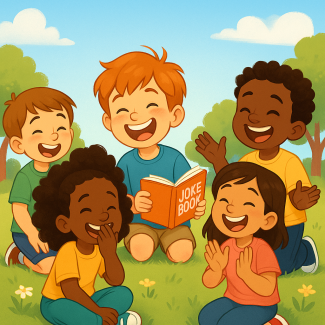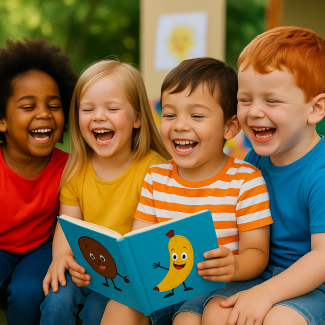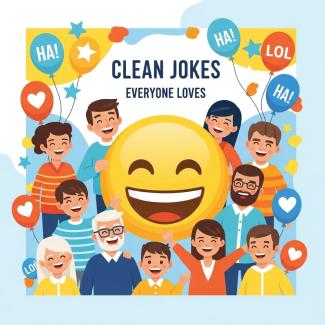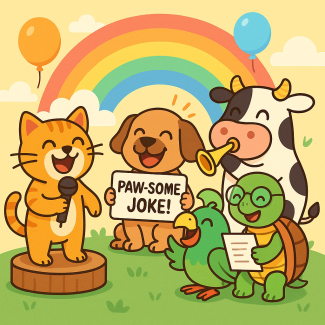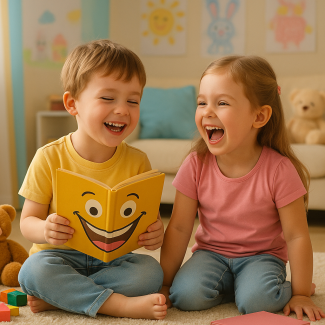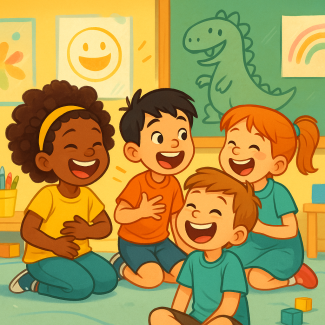
Funniest Kids’ Joke Questions With Clever, Silly, and Laugh-Out-Loud Answers
Why kids love question jokes — and how they help them grow
Kids are naturally curious, which is why joke questions are one of the most effective and entertaining ways to make them laugh while keeping their brains engaged. Whether it’s a play on words, a silly riddle, or an unexpected answer, these types of jokes make children think just long enough to feel the reward of understanding the punchline.
Humor plays an important role in early development. Not only does it help children build language skills, but it also encourages creative thinking, emotional expression, and social bonding. A well-timed laugh can even help reduce anxiety or lighten a tense moment. In this article, we’ve collected some of the best joke questions for kids — from clever wordplay to downright goofy answers.
How to use these joke questions for maximum fun
Whether you’re a parent, teacher, or caregiver, here are a few ways to make the most of these kid-friendly joke questions:
- Use them during car rides to keep kids entertained.
- Add them to lunch notes or birthday cards for an extra smile.
- Turn them into a fun family game night activity.
- Let your child try to make up their own punchlines for even more creativity.
These jokes are perfect for kids ages 5 and up, though many younger children will also find them hilarious with a bit of explanation.
What makes a good kids’ joke question?
A good joke question for children should be:
- Simple and easy to understand
- Clean and age-appropriate
- Based on puns, rhymes, or visual imagery
- Not too long or complicated
Kids tend to respond best to jokes where the punchline is just unexpected enough to be funny — but still something they can figure out on their own or with a hint.
30 best joke questions for kids (with answers!)
- Why did the teddy bear say no to dessert?
- Because he was stuffed!
- What do you call a dinosaur that is sleeping?
- A dino-snore!
- Why did the kid bring a ladder to school?
- Because he wanted to go to high school!
- What do you get when you cross a snowman and a dog?
- Frostbite!
- Why was the math book sad?
- Because it had too many problems!
- What did one wall say to the other wall?
- I’ll meet you at the corner!
- Why did the cookie go to the doctor?
- Because it felt crummy!
- What has ears but cannot hear?
- A cornfield!
- What kind of tree fits in your hand?
- A palm tree!
- Why did the student eat his homework?
- Because his teacher told him it was a piece of cake!
- What do you call a fly without wings?
- A walk!
- Why did the banana go to the hospital?
- Because it wasn’t peeling well!
- What do you call a boomerang that won’t come back?
- A stick!
- Why do bees have sticky hair?
- Because they use honeycombs!
- Why can’t your nose be 12 inches long?
- Because then it would be a foot!
- What do you call cheese that isn’t yours?
- Nacho cheese!
- Why did the golfer bring two pairs of pants?
- In case he got a hole in one!
- What did one volcano say to the other?
- I lava you!
- Why couldn’t the bicycle stand up by itself?
- It was two-tired!
- What animal needs to wear a wig?
- A bald eagle!
- What do you call a sleeping bull?
- A bulldozer!
- Why did the cow go to outer space?
- To visit the Milky Way!
- How do you make a tissue dance?
- You put a little boogie in it!
- What did the traffic light say to the car?
- Don’t look! I’m changing!
- What’s orange and sounds like a parrot?
- A carrot!
- Why did the chicken cross the playground?
- To get to the other slide!
- What do you get when you cross an elephant with a potato?
- Mashed potatoes!
- Why don’t eggs tell each other jokes?
- Because they’d crack each other up!
- What time is it when the clock strikes 13?
- Time to get a new clock!
- What do you call a fish without eyes?
- Fsh!
Benefits of humor for kids’ mental and social development
Laughter isn’t just fun — it’s also a powerful developmental tool. Here’s how joke questions benefit children:
- Build vocabulary and language comprehension
- Encourage critical thinking and word association
- Promote social bonding by sharing laughter with peers
- Help relieve stress or nervousness
- Strengthen memory by creating funny mental connections
A child who laughs often is often more open, curious, and resilient. Jokes can be an entry point into learning new words or practicing storytelling.
Tips for creating your own joke questions at home
Want to encourage creativity at home? Here are simple tips to help your child come up with their own funny Q&A jokes:
- Start with common words they already know (animals, food, school).
- Encourage wordplay, like rhymes or double meanings.
- Let them mix two unrelated things (like a penguin and a pizza).
- Keep it short and simple.
- Celebrate every attempt — even if the joke doesn’t land!
Laugh more, worry less
These funny joke questions for kids are more than just giggles — they’re a chance to connect, encourage, and grow together. Whether your child is sharing jokes at the dinner table or whispering one into your ear before bed, that moment of laughter builds bonds and boosts joy.
So print them out, write them down, or memorize your favorites. Because when it comes to raising happy, clever kids — a good laugh goes a long way.

